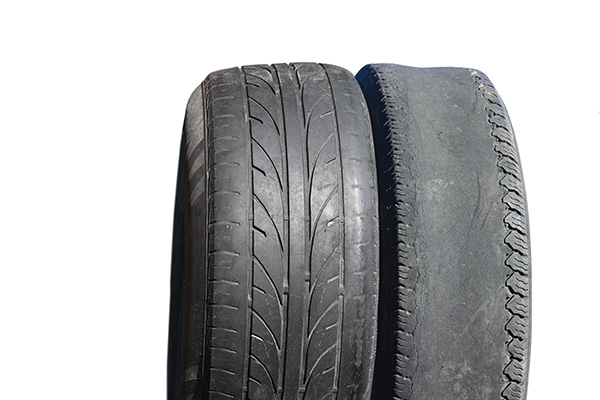
Tires are one of the most critical components of your vehicle, as they are the point of contact between your car and the road. However, tire wear is inevitable over time, but when it happens prematurely or unevenly, it can become a serious problem, leading to safety issues, reduced fuel efficiency, and the need for frequent replacements. But what causes excessive tire wear? Let’s dive into the most common culprits and how you can prevent them.
Incorrect Tire Pressure
Maintaining the correct tire pressure is key to extending the life of your tires. Both overinflation and underinflation can lead to excess wear. Overinflated tires tend to wear out the center of the tread, as too much air causes the tire to expand beyond its optimal shape. Underinflated tires, on the other hand, wear more on the edges since the tire surface flattens, causing increased contact with the road.
How to prevent it
Regularly check your tire pressure—at least once a month—and ensure it matches the manufacturer’s recommendations. Proper tire inflation not only prevents excessive wear but also improves fuel efficiency and vehicle handling.
Misaligned Wheels
When your wheels aren’t aligned correctly, your tires don’t contact the road evenly. This uneven contact can lead to rapid wear on certain parts of the tire tread. Hitting potholes, curbs, or driving on rough roads can knock your wheels out of alignment. This not only results in excessive tire wear but also affects steering and handling.
How to prevent it
Have your vehicle’s alignment checked periodically, especially after any incidents that may have jolted your suspension system. If you notice your vehicle pulling to one side or uneven wear on your tires, it’s time for an alignment check.
Unbalanced Tires
Tire imbalance occurs when the weight of the tire is not evenly distributed around the wheel. This imbalance can cause your tires to wear more on one side than the other. It can also lead to vibrations while driving, particularly at higher speeds, which is another sign that your tires may need balancing.
How to prevent it
Ensure your tires are properly balanced when they are installed or rotated. If you feel vibrations while driving, it’s a good idea to get your tires checked for balance.
Suspension Problems
Your vehicle’s suspension system plays a major role in how evenly your tires wear. Worn or damaged suspension components, such as shocks, struts, or ball joints, can cause your tires to bounce and make uneven contact with the road. This bouncing can lead to “cupping,” a pattern of uneven wear across the tire.
How to prevent it
Have your suspension system checked regularly and replace worn components as needed. A well-maintained suspension helps your tires wear evenly and improves overall vehicle stability.
Driving Habits
Believe it or not, how you drive can greatly affect your tires. Aggressive driving habits like hard braking, rapid acceleration, and sharp cornering can all lead to excessive tire wear. Tires endure more friction during aggressive maneuvers, causing them to wear out faster.
How to prevent it
- Drive more smoothly.
- Avoid rapid starts and stops.
- Take corners at a reasonable speed.
Not only will your tires last longer, but you’ll also reduce the risk of accidents and improve your fuel efficiency.
Failing to Rotate Tires
Tire rotation is one of the simplest yet most effective ways to ensure even tire wear. Because front and rear tires wear differently due to the roles they play in steering, braking, and accelerating, failure to rotate them regularly leads to uneven wear. Typically, the front tires wear faster due to steering forces, while the rear tires bear more of the weight.
How to prevent it
Rotate your tires every 5,000 to 7,000 miles, or as recommended by your vehicle’s manufacturer. Regular tire rotation helps ensure all four tires wear evenly, which can extend their lifespan and enhance performance.
Extend the life of your tires today! Stop by Oceanworks Berkeley for regular maintenance and ensure your tires are road-ready and performing at their best.